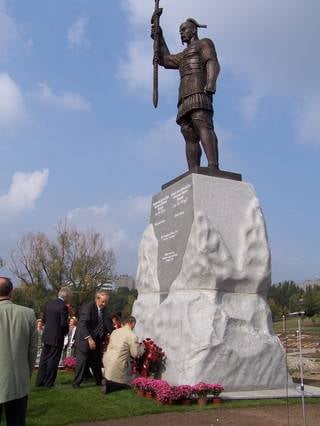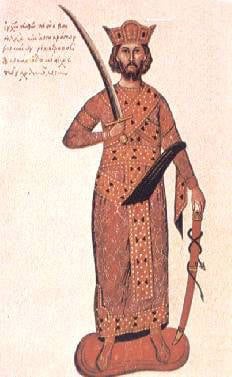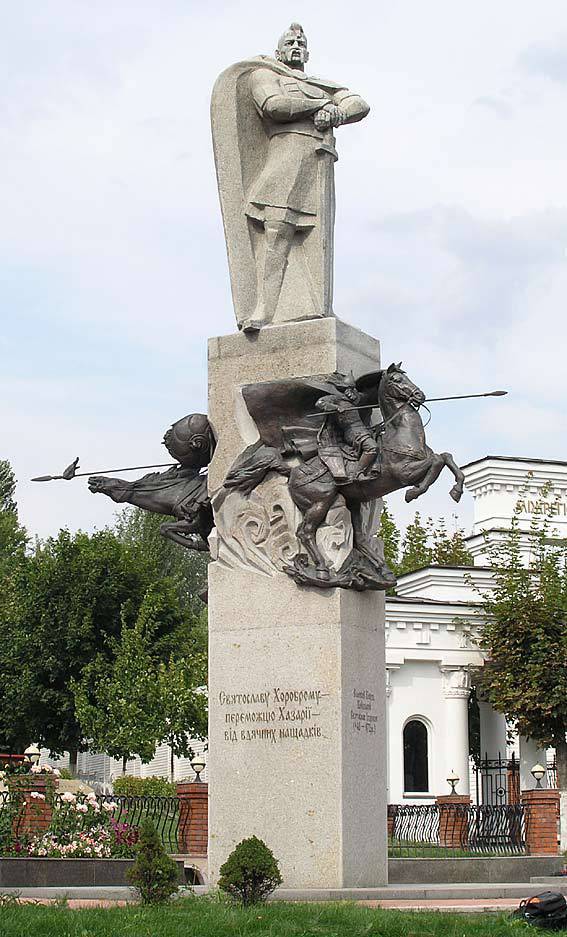The war with the Byzantine Empire. The death of Svyatoslav
 While Svyatoslav Igorevich settled things in Kiev, the Romans didn’t sleep, having launched a stormy activity among the Bulgarians. They were again called “brothers” by faith, assured of friendship, promised to marry princes Boris and Roman to representatives of the imperial house. A river poured gold into the pockets of the boyars, and as a result, the weak-willed Peter went again in the wake of the crafty Byzantines. True, he soon died, he was replaced by Boris II, but the new tsar was, like his father, hesitant. He concluded with a secret treaty directed against Russia.
While Svyatoslav Igorevich settled things in Kiev, the Romans didn’t sleep, having launched a stormy activity among the Bulgarians. They were again called “brothers” by faith, assured of friendship, promised to marry princes Boris and Roman to representatives of the imperial house. A river poured gold into the pockets of the boyars, and as a result, the weak-willed Peter went again in the wake of the crafty Byzantines. True, he soon died, he was replaced by Boris II, but the new tsar was, like his father, hesitant. He concluded with a secret treaty directed against Russia.At this time in Constantinople there was one of the bloody coups typical of its historical development. Emperor Nikifor II Fok was a military man, unpretentious, not inclined to luxury and bliss. He was a man of deep faith - patronized the monks of Athos, famous for their asceticism. He lived in a Spartan style, slept on the floor, kept long posts. Most of the time spent in war, in military camps, enjoyed great respect among the soldiers. In this regard, like Svyatoslav. Therefore, and in the capital, he began to introduce their own orders, aimed at strengthening the empire, suppressing the signs of decomposition. He fought with the then corrupt officials, pursued bribe takers and embezzlers. He abolished the excessive luxury of the court, numerous costly ceremonies, saved public funds. In addition, his plans were reforms aimed against the nobility and even the clergy, he planned to cancel a number of their privileges, to improve the situation of the common people. Even the bishops, who had been unjustly seized, took the land, removed them from their posts. As the historian Leo Deacon wrote: “Many blamed him for the shortcoming that he demanded from all unconditional respect for the virtues and did not allow the slightest deviation from strict justice.” Because of this, he was hated by the entire court, who "used to blithely spend day after day."
Therefore, the nobles, the clergy, and even his wife, the harlot Feofano, dissatisfied with the severity and unsociability of the new husband, united against him. At the head of the conspiracy stood the commander, a relative of Nikifor - Joaann Tzimisches, an absinthe unprincipled man, who became Theofano's lover. And the first conspiracy was uncovered, Nikifor found supporters at court (or they wanted to eliminate competitors). But Nikifor Fok showed excessive mercy, which can not be applied to people who do not know honor and conscience, Tzimisia sent from the capital, and stopped communicating with his wife. Tzimishy. He secretly returned to the capital, the servants of the empress at night let in Timiskes Palace with his thugs. Nikifor after bullying, killed his cousin Tzimiskes. The nobility and the clergy were pleased, but since the murder was too scandalous, a "lightning rod" was needed. Therefore, Patriarch Polievt "demanded" to punish the guilty. John Tzimiskes punished his followers - he called his "friend" Lev Volant as the murderer, executed him, and Feafano was exiled to a monastery, she was declared the main conspirator. In addition, the church demanded "repurchase" - to return the confiscated land, to restore the displaced bishops at the posts. Tzimiskes fulfilled these requirements. All propriety was kept, and the patriarch held the ceremony of elevation of the fratricide Tzimshiy to the basilica.

Nikifor II Fock.
Second Bulgarian Campaign
At the beginning of 970, the Bulgarian Tsar Boris spoke out against the Rus and laid siege to the Russian garrison under the command of the voivode Wolf in Pereyaslavets. The Ruses steadfastly fought off attacks, but when the food ran out, it was necessary to find a way out, and the Wolf found it. The remnants of the garrison made a breakthrough and cut their way to freedom. They began to retreat towards their homeland, in the lower Dniester united with the army of Svyatoslav, who was returning from Russia with fresh forces.
He acted, as always swiftly and decisively. Near Pereyaslavets (or it is also called the Small Preslav) a hard battle broke out. The forces were equal, and the battle lasted until the evening, but the Rus eventually took up, the Bulgarians ran. Pereyaslavets "took a copy", the townspeople have changed the oath and betrayed the Wolf, were executed. Boris was frightened and began to ask for peace, he pledged allegiance, making excuses, he admitted that “the Greeks had outraged the Bulgarians”. Svyatoslav himself guessed that the Bulgarians did not come up with themselves to revolt, but now he received proof.
After that, it was decided to go to Constantinople to put an end to the vile attacks of the Romans. A call message was sent: “I want to go to you ...”. By the way, the reason was not only the confession of Boris, but also the mean murder of Nikifor Focha. His Svyatoslav considered his comrade with whom they stormed Crete, beat the Arabs. For which it was necessary to avenge, blood for blood, according to the customs of the Rus.
War with Byzantium
He spent a good preparation for the war: the old allies were the Hungarians-Magyars, the allies in the war with the Khazars were the Pechenegs, and many simple Bulgarians joined his army, they sympathized with the Russians, their prince. The Byzantine authors called the Rus forces “Great Skuf,” that is, “Great Scythia.” What is interesting is that there were Romani Greeks among Svyatoslav's comrades-in-arms, among them Nikifor Foki-Kalokir. There is a possibility that Svyatoslav envisioned a scenario for the establishment of a vassal government in Byzantium. After all, it is better to have a Greek in Constantinople, who better understands the local “cuisine”, supported by the garrison of the Rus.
Svyatoslav did not wait for the approach of the Allied forces and hit, not giving time to the enemy to prepare. Russian troops crossed the Balkan Mountains and captured the Philippopol and several other cities. John Tzimiskes did not expect that Svyatoslav would come so soon and did not have time to concentrate serious forces on the Balkans. To delay the time the embassy was sent, Svyatoslav demanded to pay a tribute, which for several years had not been paid. When he was asked how many soldiers he had to calculate the ransom, Svyatoslav exaggerated his forces by half. He had a total 10 thousand army. In case of refusal to pay, he promised to expel the Greeks from Europe to Asia, moreover, he did not rule out planting his “legitimate” basil in Kaliningrad - Kalokir, or Bulgarian Tsar Boris.
Tzimiskhiy, on the other hand, did the same; he did what Nikifor Fock did not dare - he took two armies (Warda Skleer and Peter Foki) from the Syrian direction, they marched towards the Second Rome with a forced march. Because of this, the Arabs were able to repel Antioch. The first to enter the battle was the army of Perth Foki, it suddenly for soldiers Svyatoslav crossed the Bosphorus and entered the battle. She was several times superior to the rather modest forces of Svyatoslav, therefore, part of the soldiers were afraid. Then Svyatoslav made his famous speech, which had forever been remembered by the Russian clan: “We have nowhere to go, whether we like it or not, we must fight. So we will not shame the Russian land, but let us lay down here with bones, for the dead do not have shame ... ". And he continued: “Let us be strong, and I will go ahead of you. If my head falls, take care of your own. ” His squad was worthy of his great prince, the warriors replied: "Where your head lies, there we shall lay down our heads." In the terrible "Great Sich" the Rus took up, and "Bezhash Greci".
After this battle, the allied cavalry of the Pechenegs, Magyars, reinforcements from Kiev came and Svyatoslav launched a new offensive - “fighting and hail breaking”. Constantinople itself was under threat. It should be noted that the Greek authors, following the tradition of the information war against the "barbarians", "Scythians", "Tauroskifs", silenced this crushing defeat, describing the battles exclusively. As victorious, where units of the Romais and hundreds, thousands of barbarians, “Tauroskifs” died. They did not report panic in the capital - “Russians are coming!” From the messages, the army of Peter Fochi disappeared (!) As if it had never existed. Although some traces of panic have survived, so there is an inscription found by archaeologists by Metropolitan Melitinsky John, he did it on the tomb of Nikifor Foki. The metropolitan complained that the “Russian armament” would take the Second Rome day after day, called upon the murdered basil to “rise”, “cast off the stone” and save the people, or “take us to his tomb”.
The situation was complicated by the fact that in Asia Minor the uprising was raised by the brother of the murdered basilica - Ward Fock. Therefore, Zimiskhiy asked for Svyatoslav mercy. Svyatoslav, whose army (especially in the Russian part of it) suffered heavy losses in a terrible, though victorious battle, decided to go on a truce and recuperate. In addition, a fresh army approached Constantinople — Barda Sklier. The Romans gave all the old debts, paid a separate indemnity to the army, including the dead. In Rus it was decided to transfer the proportion of the dead, his family, family. The first round was left for the Russians, the Russian troops returned to Bulgaria, Svyatoslav released the allies.
New war
At this time, Tsimiskhiy threw Warda Sklier’s army against Warda Foki, the rebellion was drowned in blood. But if the Ruses, Slavs, steppe peoples and other "barbarians", as they called in Rome and Constantinople, believed the Word, the oaths, the Romans were faithful to their crafty politics. In his "Strategicon", Kekabman wrote the following: "If the enemy sends you gifts and offerings, if you want, take them, but know that he does this not out of love for you, but wanting to buy your blood for this."
Tzimisces was secretly preparing for a new war, he cannot be denied a strategic mind, he was a cunning, intelligent man. From all corners of the empire, troops were formed, a special guard was formed — the “immortal,” armored cavalry. Gold was sent to the Pechenegs. Bribed part of their birth. Bribed Bulgarian boyars, without a fight, passed passages in the mountain passes. At Easter 971, they removed the Bulgarian garrisons (simple Bulgarian soldiers did not like the Romans, they respected Svyatoslav) by letting them go home for the holiday. But Tzimiskes at this moment, violating all agreements, oaths, struck a treacherous blow. His army invaded Bulgaria, approached the capital - the Great Preslav.
There was located the Russian squad Sveneld with the allied Bulgarian troops. The battle went on for two weeks, the Russian-Bulgarian forces repelled the storms, but when the wall-breaking machines broke through the walls and the Romans broke into the Bulgarian capital, the Rus and the Bulgarians did not fold weapon and took the last mortal combat. The remnants of the squad of Sveneld managed to cut through the enemy ring and leave, the remnants of the other troops took the battle in the palace, all were killed, the enemy did not surrender.
Tzimiskes announced. that he came as the "liberator" of the Bulgarians from the yoke of the Russians. But the common population had good reasons not to believe him - the Roman soldier robbed, killed, created violence against women and girls. Moreover, they did not hesitate to rob the Bulgarian churches - their “Christian brothers”, as the army commander John Kurkua, according to the Greeks themselves, looted many churches “by turning the roses and sacred vessels into their property”. An interesting picture, an ardent pagan Svyatoslav spared Christian shrines, and the Byzantine "Christian brothers" defeated and plundered. Tsar Boris was arrested, his treasury was seized, which, again, Svyatoslav did not do the barbarian. Pliska and Dinea were taken and looted.
Svetoslav received the news of the storming of the Great Preslavs, moved to the rescue, although he didn’t have much strength - only the squad and the allied troops of the Bulgarians, the Pechenegs, the Magyars, and the war with Russia were sent home. On the way, having learned that the Bulgarian capital had fallen, and innumerable regiments were going to meet me, I decided to take the fight in Dorostol-Silistra on the Danube. Zimiskhiy could not defeat a small army of the Rus and the Bulgarians, Svyatoslav with his attacks did not allow him to bring closer to the fortress and install wall baton tools. In one of the battles, the army of Tzimisces was saved by a miracle - the Russian “wall” headed by Svyatoslav crushed the flanks of the Romans, threw the “immortals” into battle, but they would not have stopped the “dazha divine grandsons” if it had not risen a terrible headwind that had blinded Russian army. Svyatoslav is once again undefeated, led the army into the fortress. On this day, the Romans later thanked the Virgin Mary for help. In battle, both the looter Jann Kurkua and a number of other commanders of the Romans died.
In one of the sorties, 2 ths. Squad destroyed the enemy escort, raided the Danube, seizing provisions. But the situation was complicated by the fact that the army was weak, the loss, unlike the Romans, was not anyone to compensate. Food ran out. Interestingly, in this war, the Greek authors noted such a fact, among the killed Russians, Bulgarians, there were many women. But Tzimiskes was also in a difficult situation, a terrible battle was remembered - what if the Svyatoslav rushes are capable of one more such battle? The army suffered heavy losses, alarming news came from the empire, and the siege was delayed. Suddenly, help will come to Svyatoslav - the Russian army, or the Hungarians?
As a result, it was decided to adopt a world that was mutually beneficial and honorable for Svyatoslav. Although everyone understood that this was only a truce, Svyatoslav would not forgive the oath of crime Tzimiskes. Svyatoslav agreed to leave Bulgaria, the Byzantine side confirmed the payment of the annual “tribute”, they recognized for Russia access to the Black Sea, conquered from the Khazars Kerch and Taman (“Cimmerian Bosporus”). The Romans freed the road to Russia, supplied the Svyatoslav detachments with food. A personal meeting of Svyatoslav and Tzimiskes took place; Greek sources, reporting on the appearance of the Grand Duke, who was no different from ordinary warriors, did not report the essence of their conversation.
Hero's death
Tzimisces understood that if not to eliminate Svyatoslav peace will not be - there will be a new war and this time the Rus will not give mercy, the payback will be complete. The empire is unlikely to survive the new war. Therefore, in the course went a proven tool - gold, the Pechenegs were bought, they blocked the way along the Dnieper. It was also impossible to go Kerch - winter storms raged.
Therefore, Svyatoslav having released most of the squad with Sveneld, she left on horseback, began to wait with a personal small squad and wounded, sick on the White Coast (Kinburn Spit). He was waiting for help from Kiev. But according to a number of researchers. He was betrayed by Sveneld, who wished to become the ruler of the young Yaropolk. He was supported by a part of the boyars, they were accustomed to be masters in Kiev and did not want the power of a stern prince, before whom they would have to answer for their affairs. In addition, in Kiev, there was already a “Christian underground” that hated the ardent pagan Svyatoslav. Perhaps he had contacts with Byzantium as well, and he negotiated in Dorostol with Feofil.
In the spring, not seeing the Pechenegs, they cheated, walked away from the rapids, Svyatoslav decided to go for a breakthrough. Perhaps they were waiting for support from Kiev, which was not there. This fight was the last for Svyatoslav, his personal squad and he himself was all killed in this desperate wheelhouse. But the dead do not have shame, shame goes to traitors ...
Svyatoslav entered the Russian historyas the greatest commander and statesman, whose impertinent thought was equal to the thoughts of Alexander the Great. He is an example for every Russian warrior, a man. Straight and honest, like a Russian sword.

Monuments from sculptors Oles Sidoruk and Boris Krylov.
Sources of:
Kargalov V.V., Sakharov A.N. Commanders of Ancient Russia. M., 1985.
Pashuto V. T. Foreign Policy of Ancient Russia. M., 1968.
Sakharov A.N. Diplomacy of Ancient Russia of the 9th - first half of the 10th century. M. 1980.
Sakharov A.N. Svyatoslav's Diplomacy. M., 1991.
F. Uspensky. History of the Byzantine Empire. T. 1-4. M., 2001.
http://www.rummuseum.ru/portal/node/694
http://www.hrono.info/dokum/1000dok/povest1.php
Information